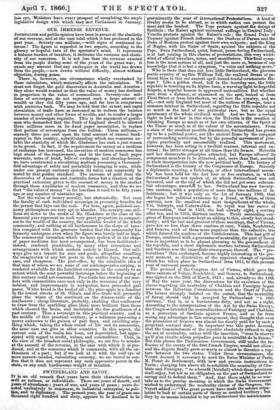OUR IMMENSE REVENUE.
Jotter:Aram and public opinion have been in amaze at the elasticity of our revenue, and at the vast total which it has produced in the past year. Seventy-one millions,—with signs of continued ,in- crease ! The figure is regarded in two aspects, according to the gloomy or hopeful turn of the spectator's mind. It represents a hideous burden of taxation, it indicates the vastness and elasti- city of our resources. It is not leas than the revenue exacted from the people during some of the years of the great war ; it excels any amount that any exchequer in the world has drawn from the people,—now drawn without difficulty, almost without objection, during peace.
There is, however, one circumstance wholly overlooked by these calculators' which materially affects the calculation. We must not forget the _gold discoveries in Australia and America ; they alone would remind us that the value of money has declined in proportion to the value of commodities. Seventy-one mil- lions of sovereigns, do not represent such a large amount of wealth as they did fifty years ago, and far less in comparison with centuries back. We may be told that the extent and rapid circulation of trade have so increased as to redress the balance between money and other forms of wealth, and to render a larger number of sovereigns requisite. This is the argument of gentle- men who demanded that the Bank of England should be allowed three millions more in its fixed paper speculation, to replace that portion of sovereigns from the bullion. Three millions,— scarcely three per cent upon the total amount of annual bank- ruptey in this country, notwithstanding which our resources ex- hibit the elasticity of which Mr. Gladstone has such a just reason to be proud. In fact, if the requirement for money as a medium of exchange has increased, the invention of modern commerce has kept ahead of the requirement, and in the form of bank paper warrants, notes of hand, bills of exchange, and clearing-houses, we have constructed a circulating medium possessing a thousand- fold advantage of safety and portability belonging to coin, while under our present currency system its value can constantly be tested by that golden standard. The increase of gold from the discoveries of America and Australia forms but a fraction of the practical extension given to the amount of money in the market through these auxiliaries of modern commerce, and thus we see that "the value of money" is far less than it used to be fifty years ago or any number of oenturies.ago. Not the value of money morally, but abstractedly. Not even the faculty of each individual sovereign in procuringlienefits for the person that lays out the cash. For here, again, political-eco- nomy philosophers are very apt to blunder. The seventy-one mil- lions set down to the credit of Mr. Gladstone at the close of the financial year represent no such-very great proportion in compari- son to the wealth of the country, the available wealth of the whole community, and nothing at all burdensome in the shape of taxa- tion compared with the grievous burden that the community has formerly undergone even when the figure was barely half as high. The commercial invention which we have spoken of in the shape of paper mediums has been accompanied, has been facilitated— indeed, rendered practicable, by many other inventions and arrangements with which modern society is blessed. Our rail- ways give us a transit for men and gooas, altogether excelling the imagination of any but poets in the earlier days, for speed, ease, and cheapness. The post-office, by the admirable idea of that man at whom we see some of our contemporaries carping, is rendered available for the humblest creature in the country to an extent which the most powerful Sovereign before the beginning of this century could not command. Free trade has crowded our mar- kets with commodities once seen only in the mansions of the very noblest, and improvements in navigation have proceeded pani passn. White bread is the food of all ; the pine-apple is a familiar in the lowest streets of St. Giles's, and free-trade will presently place the wines of the continent on the dinner-table of the coalheaver ; cheap literature, probably, enabling that coalheaver to draw from the sparkling glass ideas more brilliant than those which cheered the brain, and inebriated the fine gentlemen of a past century. Thus a sovereign in this practical country, and in the middle of this practical century, is a talisman possessing a power unknown to the guinea of past days, and excelling any- thing which, taking the whole round of life and its aceessories, the same sum can give in other countries. In this aspect, the current coin of the realm has been, not depreciated, but appre- ciated with regard to credit, values, and commodities. Thus, in the view of the broadest social philosophy, we are free to wonder at the amount of the revenue at the ease with which it is pro- duced, and at the resources which it commands, with all the en- thusiasm of a poet ; but if we look at it with the cold eye of mere narrow-minded, calculating economy, we are bound to con- fess that it does not represent any such oppressive power in the state, or any such burdensome weight of taxation.


























 Previous page
Previous page